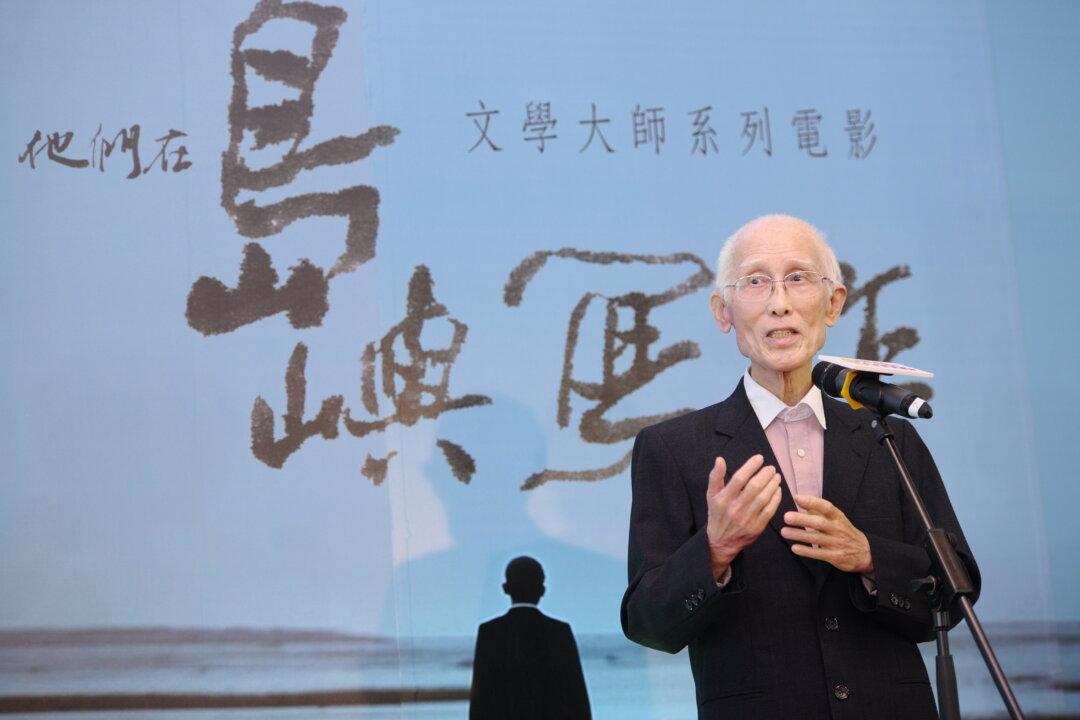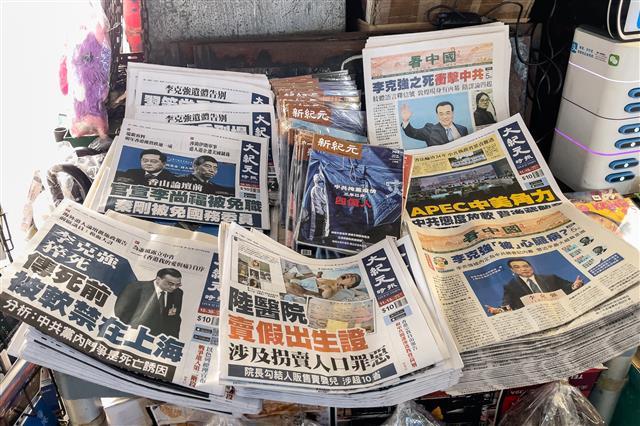A Hong Kong court has rejected an appeal from the the Hong Kong Department of Justice (DOJ) over a lower court’s decision to acquit a woman for holding a banner.
Dong Ming, a Falun Gong practitioner in Hong Kong, was pushing a trolley with a banner that read “Falun Dafa is good, Truthfulness-Compassion-Tolerance is good” and a placard beside it at the Tung Chung Bus Terminus on May 28, 2021. About two hours later, when she and her friend were packing their belongings and preparing to leave, Food and Environmental Hygiene Department (FEHD) officers confiscated the items.
Dong was later fined for “displaying/posting posters on private land without permission.” She denied the accusation, choosing to defend herself in court, and was acquitted on June 22, 2022.
The DOJ refused to accept the judgment and applied for a review. On Dec 29, 2022, Court of First Instance Magistrate Jason Wan Siu-ming oversaw it in the Eastern District Magistrates’ Court. Citing a previous case, the prosecution argued that it was unnecessary to have repeated action to prove “permanence and habitual regularity” and that the defendant’s display of the banner for two hours and nine minutes was sufficient proof of that.
Wan said that the previous higher court case did not mention how much time must be shown to meet the definition of the charge, but in his view, two hours was not good enough. He said, “if two hours is what is needed in the provision, then when it takes 2 hours to participate in the parade starting from Victoria Park, wouldn’t everyone be arrested?”
“If there are slogans on my clothing, will I be breaching the rule by just waiting for someone at the bus terminus for two hours?”
He also pointed out that the legislative intent of Article 104 of the “Public Health and Municipal Services Ordinance” is to regulate street posters, not to charge demonstrators. The interpretation of Article 104A needs to balance between the maintenance of urban city appearance and freedom of speech.”
After hearing the arguments of both sides, Wan said he would read the higher court’s ruling on the previous case in detail and postponed the ruling until Jan. 12.
Responding to the prosecution’s argument, Dong said, “It’s rare for me to come out and set up (the banner). She insisted the court should also consider why she showed the banner in public—namely that the Chinese Communist Party continues to brutally persecute Falun Gong practitioners, many of whose organs were harvested while they were still alive.
“We are just calling for help,” she added. “Falun Gong is legal in so many countries around the world. We are just making our grievance heard. We are calling for help. When the persecutors are not found guilty, but the one calling for help is, what sort of law is it?“ she said. In addition, as the COVID-19 pandemic wreaks havoc in China, Dong hopes to encourage and comfort people with her faith, telling them to remember that ”Falun Dafa is good. Truthfulness, compassion, and tolerance is good,” which she believes will help people gain peace and health.
After the verdict was announced, Dong asked in court for the return of the confiscated personal items. Fung Nat-tin, the attorney representing the prosecution, said that the FEHD would consider the return date after all other FEHD-related Falun Gong cases are over.
FEHD Confiscates Displays from Falun Gong Practitioners
Since the CCP started persecuting Falun Gong in 1999, Hong Kong Falun Gong practitioners have peacefully protested in various ways, trying to tell people the truth about Falun Gong. Falun Gong practitioners’ banners and placards are often seen in downtown and scenic spots in Hong Kong.In 2013, former Chief Executive Leung Chun-ying ordered the FEHD to confiscate many Falun Gong practitioners’ banners and display boards.
Two Falun Gong practitioners applied for judicial review that same year. In 2018, the Court of First Instance of the High Court ruled that Section 104A of the Public Health and Municipal Services Ordinance “prohibiting the display of posters without permission” gave the FEHD too much discretion and ran counter to the principle that restrictions on civil liberties must be “prescribed by law.” The court sided with the Falun Gong practitioners.
However, the government won the subsequent appeal, and the two Falun Gong practitioners applied for permission to appeal to the Court of Final Appeal, but on May 13, 2022, the latter announced that it would not accept the case.
On May 27 and 28, 2021, the FEHD, the Lands Department, and the police jointly took action to confiscate Falun Gong practitioners’ exhibits in many places around Hong Kong. According to incomplete statistics from The Epoch Times, at least seven Falun Gong practitioners were served the fine from the FEHD after the operation. This was the very first case to go to trial.
Falun Gong, also known as Falun Dafa, is a Chinese spiritual practice consisting of simple, slow-moving meditation exercises and teachings based on the principles of truthfulness, compassion, and tolerance. It grew in popularity during the 1990s, with 70 million to 100 million adherents in China by the end of the decade, according to estimates at the time.
In July 2006, David Kilgour, former director of Canada’s Asia-Pacific Department, and David Matas, an international human rights lawyer, published an investigative report on the CCP’s organ harvesting operation from living Falun Gong practitioners. This report was adapted and cited by the United Nations and a lot of human rights reports from many countries. In June 2021, 12 independent human rights experts of the United Nations issued a joint statement saying that they were extremely shocked by the credible allegations of organ harvesting by the CCP against religious believers such as Falun Gong practitioners and ethnic minorities.
Case number: ESS 33435/2021




